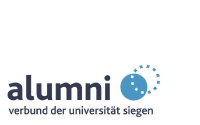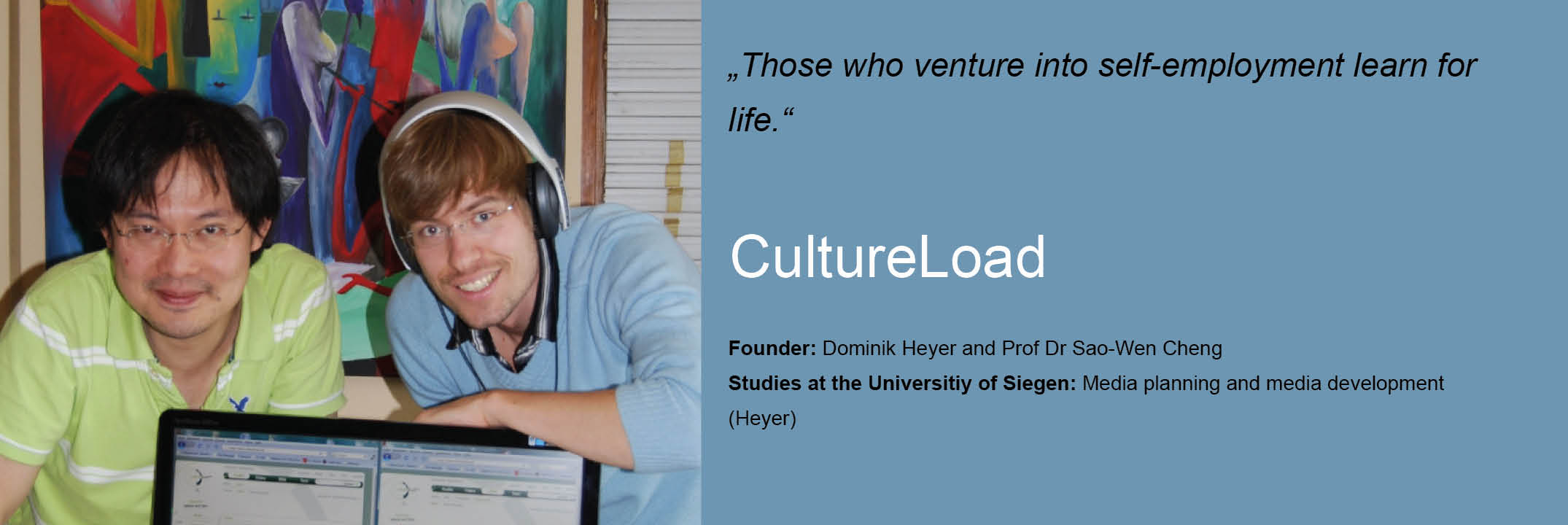CultureLoad
Prof. Dr. Sao-Wen Cheng and Dominik Heyer are the founders of CultureLoad, a platform for cultural creators. This intercultural platform allows artists to market themselves for free and connects culture enthusiasts with them beyond the mainstream.
The two founders met in 2004 at the University of Siegen. Sao-Wen was teaching seminars in the Media Planning and Development program, where Dominik Heyer was a student. “I found Sao-Wen as a lecturer totally inspiring and had him by my side as a friend at the end of my studies,” Dominik said about his former lecturer. The two founders were connected by their shared “love” for music and the academic-theoretical background from their university careers in the field of culture. Additionally, both like to work independently and are creative. The topic of interculturality is also lived and experienced by Dominik and Sao-Wen as co-founders, as one is from Berlin and the other from Taichung (Taiwan).
In 2006/7, Sao-Wen and Dominik founded the CultureLoad platform with great motivation and an EXIST founder grant. However, the company no longer exists today. The founders say they chose the wrong business model back then. “Unfortunately, 15 years ago, we did not bet on the Netflix model of streaming, but on downloading. At a time when iPods were booming, we did not foresee that streaming would prevail,” Dominik explains. Today's streaming services like Spotify and others use freelance artists as marketing channels, not as distribution channels, as CultureLoad was originally intended. “We both still have a great interest in promoting and seeing art and culture being promoted.”
Today, Dominik works in Frankfurt am Main as managing director at F.A.Z Business Media - the financial and business publishing house from the F.A.Z group. Sao-Wen works as a professor in the Department of Business at HMKW (University of Media, Communication, and Business), also in Frankfurt.
How did you come up with the idea for CultureLoad and the online platform for cultural creators?
In the 2000s, iTunes and YouTube were founded and began to grow strongly. At that time, however, there was no distribution platform for musicians. We then wanted to create a marketplace where cultural creators could present themselves without fees and sell their products. And not just for musicians, but also for other arts such as photography, videography, and literature.
Additionally, we wanted to create a community where fans and artists could network and connect. The goal was also to connect cultures to some extent. For this purpose, we offered the platform in different languages and introduced a digital currency, which we called CultureCoin.
What attracted you to starting your own company?
The appeal of founding a company for us lies in developing our own ideas to the point of market maturity and establishing them in the market to improve existing problems or non-functioning processes or markets with new solutions. Always with the goal of making things simpler and better.
When did you decide to start your own company?
As is common before founding, we discussed a lot about the pros and cons of starting a company. At some point in this process, when the opportunities significantly outweighed the risks and our business plan was ready, we decided to found the company.
What was innovative about your company?
At that time, there was no platform where cultural creators from very different disciplines could independently, i.e., without intermediaries such as agencies or labels, gain access to an internationally designed marketing and distribution channel. The idea held a lot of potential back then.
What was the biggest challenge you faced at CultureLoad?
The biggest challenge was in developing the marketplace. A place where supply and demand meet is only an attractive marketplace if the critical mass of both is reached. Achieving the critical mass was the central task.
To what extent did the University’s founder office support you?
We benefited particularly from the exchange of experiences, support in applying for the founder grant, and the free office space provided by the founder office.
What advice do you give to young founders?
If you are not passionate about your idea or project, you should not start it at all. Not only the founding process but especially the first steps in the new self-employment offer plenty of surprises and changes that one has to respond to wisely. This is in parts a quite exhausting process that without the right motivation and passion would quickly lead to giving up.
Would you found a company again?
We would not rule it out, especially after all the experiences we had with CultureLoad. Anyone who ventures into self-employment learns for life and has the opportunity to gain expertise in very different fields. Our current activities offer so many design possibilities and large areas of responsibility that the topic of “founding” is not the next goal in the short term. But with the right idea at the right time, certainly gladly again.
This portrait is based on an interview with Dominik Heyer in September 2020 and was written by Janice Gust.


